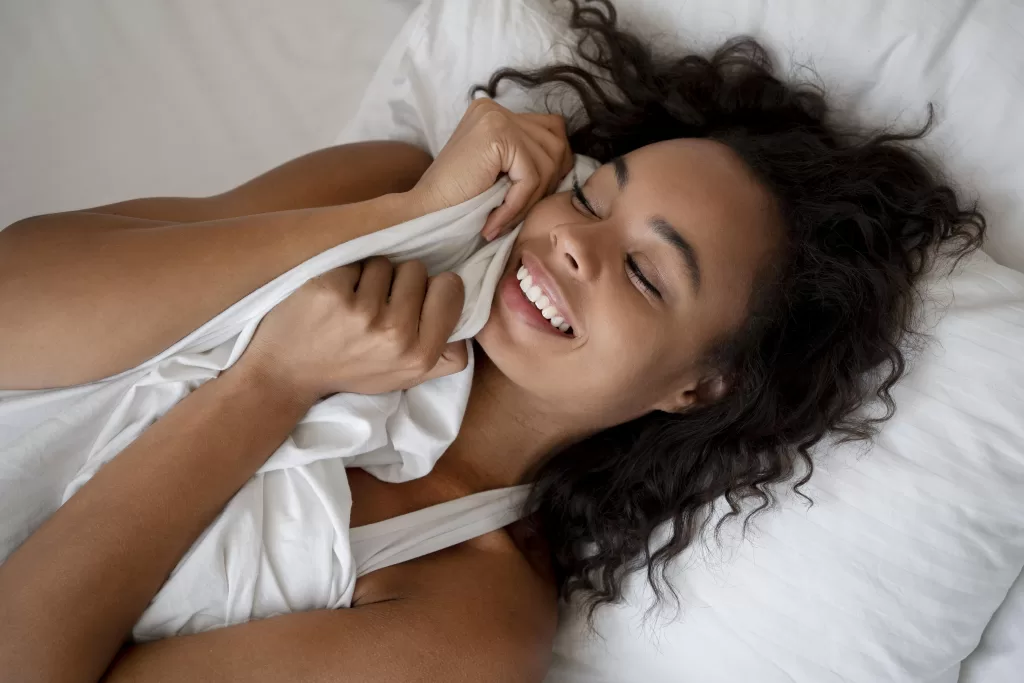In babies and children, sleep needs and challenges are similar for boys and girls, but once girls experience menstruation, they diverge. Women are twice as likely to suffer from insomnia and restless leg syndrome than men, while men are more likely to suffer from sleep apnoea… until women reach menopause, and then it’s much of a muchness.
Women’s sleep may change throughout the course of every month, depending on where they are in the menstrual cycle, as well as during particular life phases, such as menarche (the onset of menstruation), pregnancy, and menopause, because of the hormones involved.
During National Women’s Month, Restonic sleep expert Dr Alison Bentley explores women’s sleep needs and how to ensure these are met so they can unlock the power of sleep in their lives.
Sleep and menstruation
“When girls start having menstrual cycles, they will usually have oestrogen and progesterone occurring in the body. The first part of the menstrual cycle has a lot of oestrogen, which is good for sleep. Then, after ovulation occurs, there’s a lot of progesterone, which is also good for sleep. It improves sleep duration and therefore deep sleep. It’s also protective against sleep apnoea because it improves the muscle tone in the throat,” she explains. “All of these are important when we look at menopause, when there’s loss of these hormones and an increase in apnoea that occurs at that time.”
Dr Bentley says it’s also important to understand the effect that painful periods (dysmenorrhea) can have in disrupting sleep, and that sleeping poorly makes one more sensitive to pain. She suggests women ensure they speak to their doctors to get the right anti-inflammatory medicines for pain management to protect their sleep, and that for some women, it’s also worth considering taking a sleeping tablet for just the four or five days a month that their sleep is affected.
Pregnancy and sleep
Dr Bentley says that the same hormones – oestrogen and progesterone – affect sleep in pregnancy, which means pregnant women are often prone to sleep disorders.
“Many women in the first three months of pregnancy will report excessive tiredness, which is the progesterone and oestrogen,” she says. “But in the last three months, it can be difficult to sleep because of the big tummy, which can make finding a position uncomfortable and needing to get up to use the toilet more frequently. Restless leg syndrome is also more likely to happen because of iron moving from the mom into the baby and a relative iron deficiency that’s occurring in the mother. Sleep apnoea, which is a collapse of the airway, is also more likely to occur because of weight gained in the final trimester, as well as the fact that pregnant women may struggle with a stuffy nose.”
She says that while 50% of women will experience poorer sleep during pregnancy, there is a correlation between poor sleep in the final trimester and post-partum depression, so women should speak to their doctors to get support with non-medication means of managing insomnia or other sleep disorders.
Sleep and menopause
While hot flushes associated with menopause and drop-offs in oestrogen and progesterone can keep women up at night during menopause, Dr Bentley says the other thing that affects sleep is the normal changes affecting women and men as they age, which are often overlooked.
“As you get older, whether you’re male or female, your sleep is likely to be lighter, shorter and the quality is likely to be lower,” she says. “This is normal. For example, when you’re 15 years old, you get a big surge of melatonin at night, which makes you feel sleepy. But from that age onward, it drops. By the time you’re 50 or 55, the melatonin is below the level at which it’s effective, so you may find you’re not as sleepy as you used to be at night, which means it’s harder to fall asleep.”
On top of this, women dealing with menopause may experience poor sleep because lower levels of oestrogen and progesterone mean they are no longer protected from sleep apnoea and there’s a change in body weight distribution.
“You tend to have more testosterone types of hormones floating around, which causes a more male kind of body weight distribution as far as fat tissue is concerned,” explains Dr Bentley. “Putting on weight will make it even more likely to have sleep apnoea. I encourage post-menopause women who suddenly start to snore to look up the STOP BANG questionnaire, which can assist with diagnosing sleep apnoea.”
Finding help
Dr Bentley implores women who are struggling with sleep to seek help. “Please tell your doctor so that you can engage with the facilities that are available to either record your sleep to see what’s happening during the night or to get some health help in managing your sleep better,” she urges.

A good starting point is the 7-question assessment on the Restonic Ezintsha Sleep Clinic webpage, which will help you to assess whether you should consult a medical professional.
You can also find podcasts and articles on health and sleep, sleep apnoea, restless leg syndrome, developing good sleep hygiene and other helpful information to unlock the power of sleep in your life on the Restonic website.


























